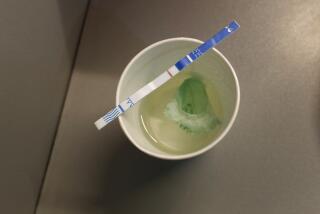Home Blood Tests Spark AIDS Debate
- Share via
Southern California clinical trials of a blood collection kit are sparking an impassioned debate over the issue of home testing for antibodies to the AIDS virus.
The kit is being marketed by USAT Laboratories Inc. of Newbury Park, Calif., which last week began taking out newspaper advertisements seeking participants in the trials. The ads have drawn intense criticism from local AIDS groups, which cite concerns about confidentiality and adequate counseling for people before they take the test and after they receive the results.
“This form of antibody testing can be very dangerous,” said Dr. John C. Wolfe, chief executive officer of AIDS Project Los Angeles. “I am very concerned about people being told they are positive over the phone. There is an incredible psychological reaction.”
He added: “Is it confidential if you send a check or use a credit card?”
In addition, officials of the Food and Drug Administration and the U.S. Postal Service say they are concerned about the ramifications of widespread mailing of human blood, some of which might be contaminated with the human immunodeficiency virus (HIV) which causes AIDS.
Company officials argue that the mail-in test provides more privacy than a visit to a doctor’s office or a blood-testing clinic, at about a third of the cost. In addition, they insist they have taken extraordinary steps to ensure clients’ confidentiality and to provide effective counseling to those who test positive.
“The issue is a major one facing this country and we’re hoping to offer an alternative to conventional testing services that are now available,” said Los Angeles physician Dr. Richard Bank, USAT’s medical director. “We’re aiming for mainstream America. Mainstream people who want the test and want anonymity and don’t want to go to a doctor’s office or a testing site.”
The FDA said last week that it is reviewing applications by four other companies for permission to conduct trials of home AIDS test kits. In addition, it is investigating reports that several other kits already are being offered for sale to the public.
None of the blood collection kits actually promises test results in the home, unlike, for instance, home test kits for pregnancy and diabetes. Instead, customers must draw a sample of their own blood, seal it in a vial and mail it either to a central company laboratory or to an affiliated blood lab in their area. They get the results seven to 10 days later by phoning a toll-free number and supplying a personal code number.
The kits first came to the FDA’s attention in January, 1986, a spokesman said. The agency ruled then that they were new medical devices subject to regulation under the federal Food, Drug and Cosmetic Act Device Amendments of 1976. Regulations are still being developed by the FDA’s office of Biologics Research and Review, whose recommendations will go to the Public Health Service for additional study.
A consultant’s report presented at a December meeting of the FDA’s Blood Products Advisory Committee advised that the home tests should meet a standard known as the four C’s: consent, (meaning that the testing is voluntary); confidentiality; confirmation (the use of additional tests to confirm preliminary screening); and counseling.
“The issues are complex--the regulation of counseling with the tests, ensuring confidential results,” an FDA spokesman said. “Then, another issue is sending blood through the mails. That’s an issue with the Postal Service, to make sure it will be sent properly.”
In Canada, health and postal officials have already completed studies of similar home antibody test proposals and ruled that there will be no transport of blood through the mails for such tests.
Meeting the Regulations
“There is heightened concern about shipping blood specimens,” a U.S. Postal Service spokesman said last week. “We want to make sure the shipping containers are safe and meet the regulations for packaging of hazardous, restricted or perishable biological materials.”
He added that postal officials in Washington are drafting a letter to major health industry groups asking that they confer with the Postal Service on the issue.
To conduct its clinical trials, USAT plans to sell 15,000 to 20,000 of its Safe Check blood collection kits at $40 each. The FDA requires that the trials include 3,000 people considered to be at low risk of acquiring AIDS and 100 from high-risk groups. High-risk groups include homosexuals and bisexuals, intravenous drug users, hemophiliacs and their sexual partners. Following the tests in Southern California, USAT will begin additional studies in the San Francisco area in four to six weeks.
If the USAT kit is approved, an FDA spokesman said, it would still take “a year or so” to reach the market. USAT says it would sell the kit for $50, about one-third of what a private physician or lab would charge.
“The vast majority of people in this country who are at high risk probably go to testing centers or their physicians,” Bank said. “But there are other people who want to know and want to do it in a private way so they don’t lose their insurance or their jobs.”
Bank said USAT has conducted two years of research on its product and will provide clients with telephone counseling before and after they get test results.
Identified by Number
To ensure confidentiality, he said, those who call to order a blood kit will be issued a confidential control number--the only identification the blood sample will have at the laboratory. Names and addresses will be placed in a separate computer file accessible only to Bank and USAT’s chairman of the board, he said. Once test results are reported to a client, the person’s name, address and credit card number will be erased from the computer files, Bank said.
At least two tests will be conducted on each blood sample: the Abbott Laboratories Elisa test and the Genetic Systems LAV Elisa test. If the sample tests positive on one or both tests, a third test--the Western Blot--will be used as confirmation, he said.
On the issue of counseling, Bank said: “Those who call to order the test will be given counseling, information and instruction. There is a manual in the kit that explains how to do (the test) and talks about AIDS. It also gives them a number they can call if they have more questions.”
When a client calls to obtain test results, the information is relayed by an individual trained in crisis intervention or a university graduate student in psychology, Bank said. If the test result is positive, the client’s call is switched to a USAT staff doctor for counseling. Additional counseling is then recommended.
Bank acknowledged that home testing precludes initial face-to-face counseling, but added: “As long as somebody is in voice contact and knows a caring person is on the other side, we can help them. And we will try to get the ones who test positive back into the medical mainstream.”
As for sending blood samples through the mails, Bank said, “Doctors have been sending blood through the mails for 25 years. Our kit (for returning the sample) has been tested and tested. We dropped the box off a six-story building and nothing happened to it. We ran over it with a pickup truck and it didn’t break the vial.”
But AIDS groups continue to bristle at the idea of home tests to determine antibodies to the AIDS virus.
“I have a real problem with the home tests,” said Dr. Mervyn Silverman, president of the American Foundation for AIDS Research, a national organization based in Los Angeles. “People have to understand what to expect and afterward how to deal with it.”
‘People Are in Shock’
Even in face-to-face counseling, he said, “after being told they are positive some people don’t even listen. They don’t hear it. . . . People are in shock. To tell them this over the phone? I just can’t see it.”
APLA’s Wolfe added: “I have been in the medical world long enough to believe that drawing blood should be done under medical supervision so the tests will be as free of error as possible. And I have a lot of questions about sending blood through the mail. I can’t get letters through the mail sometimes.”
Said Dr. Ron Bayer of the Hastings Center, a research institute for the study of medical ethics in Briarcliff Manor, N.Y.: “I am concerned that a test like this administered outside a clinical setting would open up a way to abuse. It seems critical that hearings be held to establish regulations.”
Bayer also cited broader concerns.
“Once all the technical issues are resolved,” he said, “the issue remains: What is it that would make people want to take a test like this in this particular way? Distrust of their physician, their neighbors? The mere existence of such a (home) test raises the concern of what people feel will happen to them if they are HIV positive. How will they be treated by society?”
More to Read
Sign up for Essential California
The most important California stories and recommendations in your inbox every morning.
You may occasionally receive promotional content from the Los Angeles Times.













